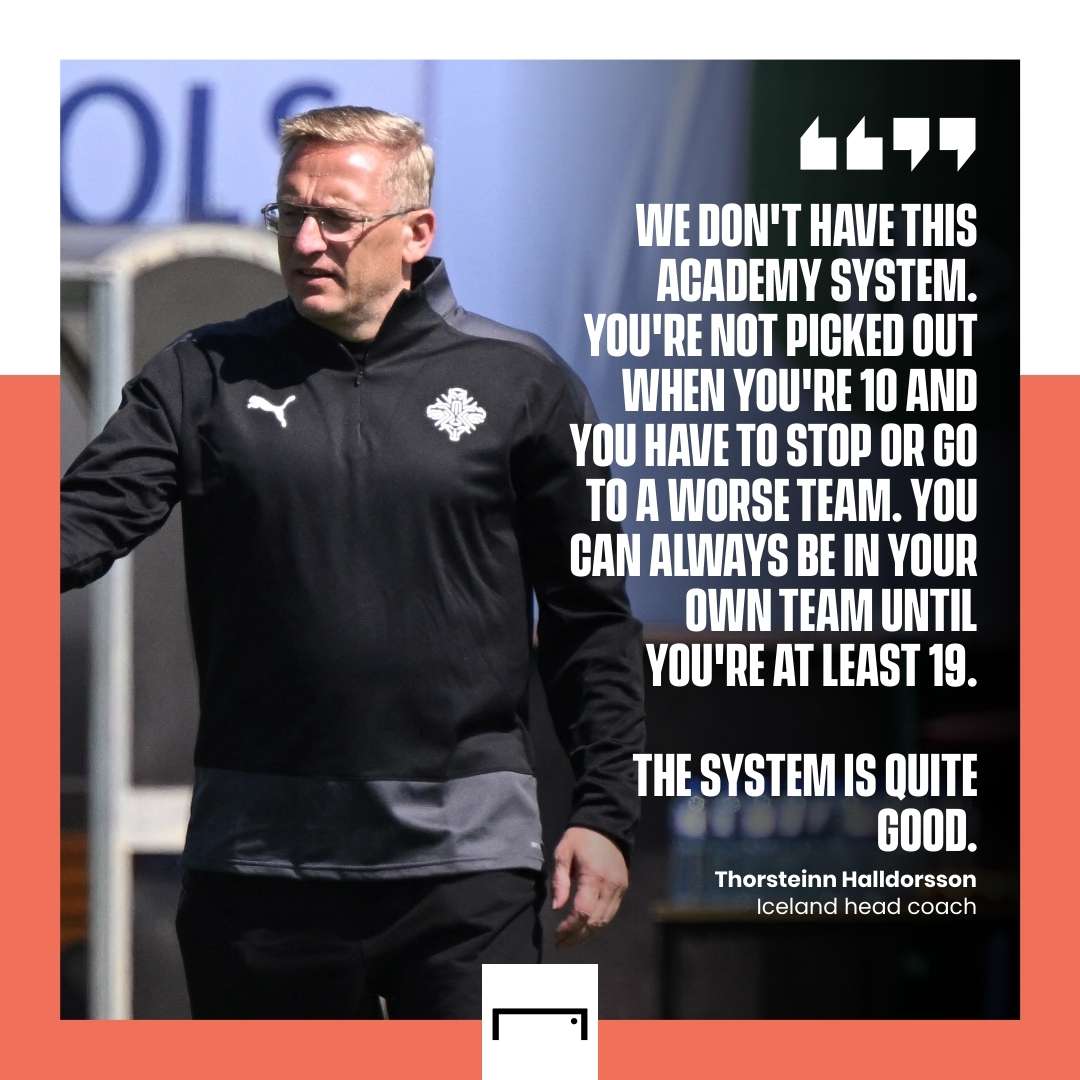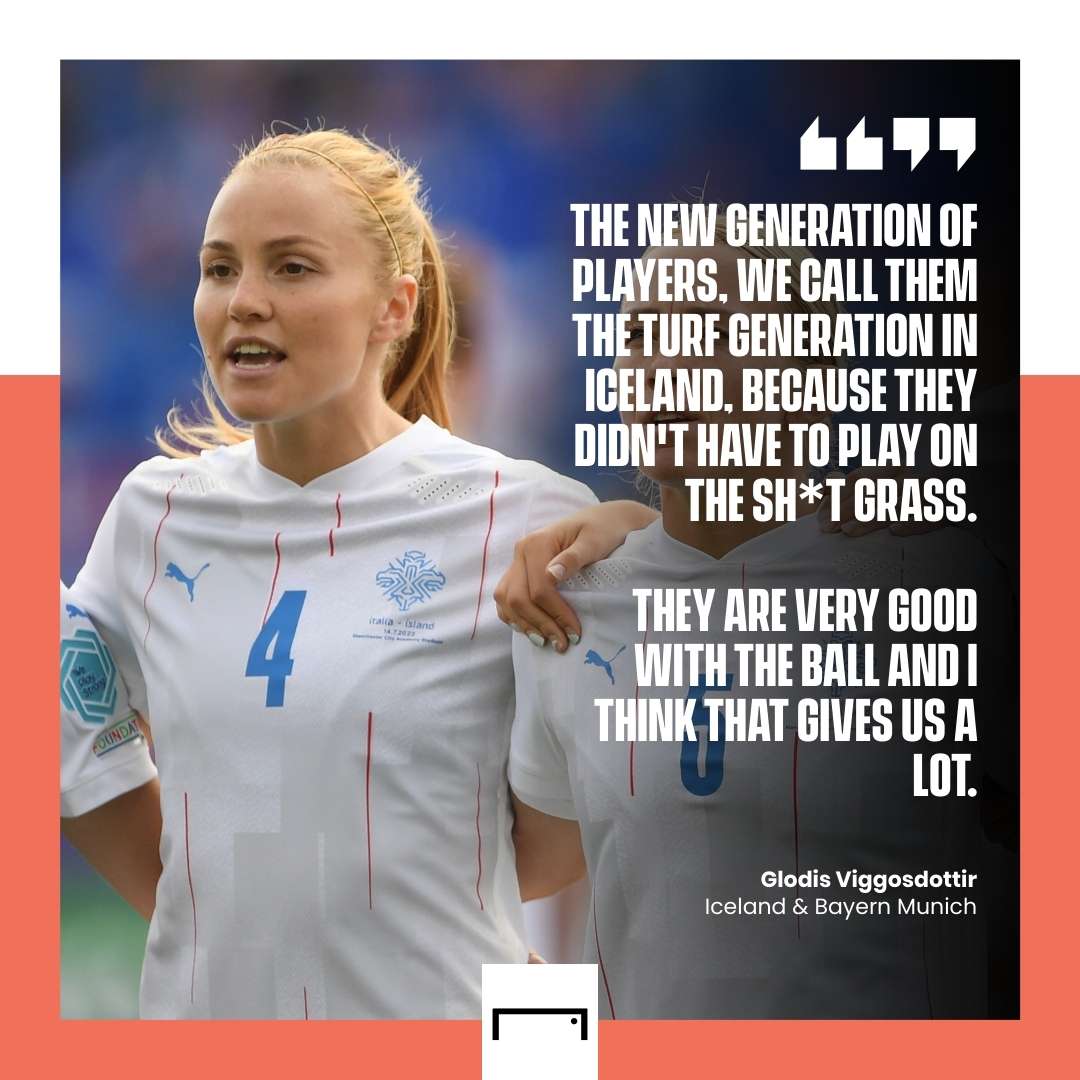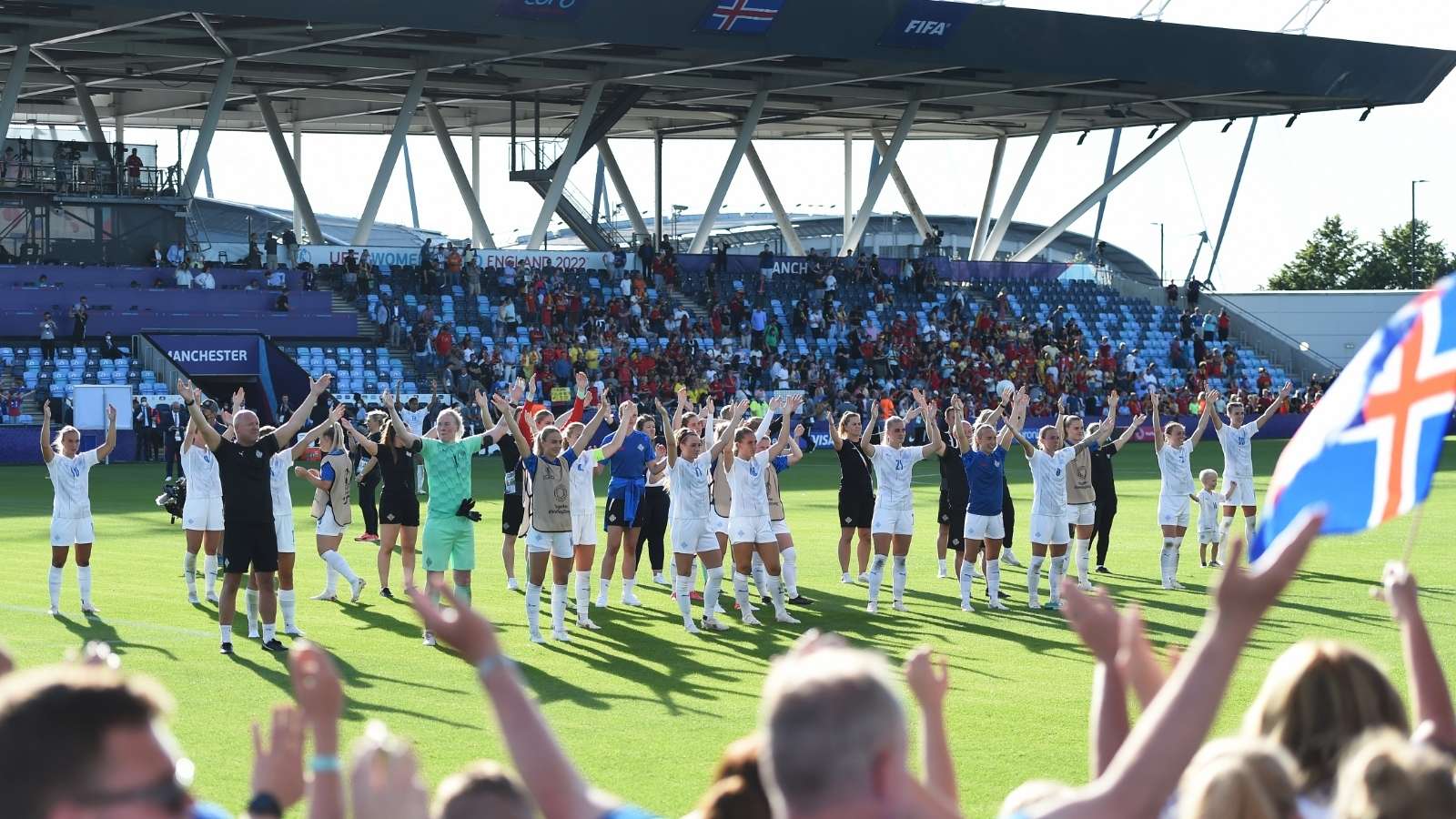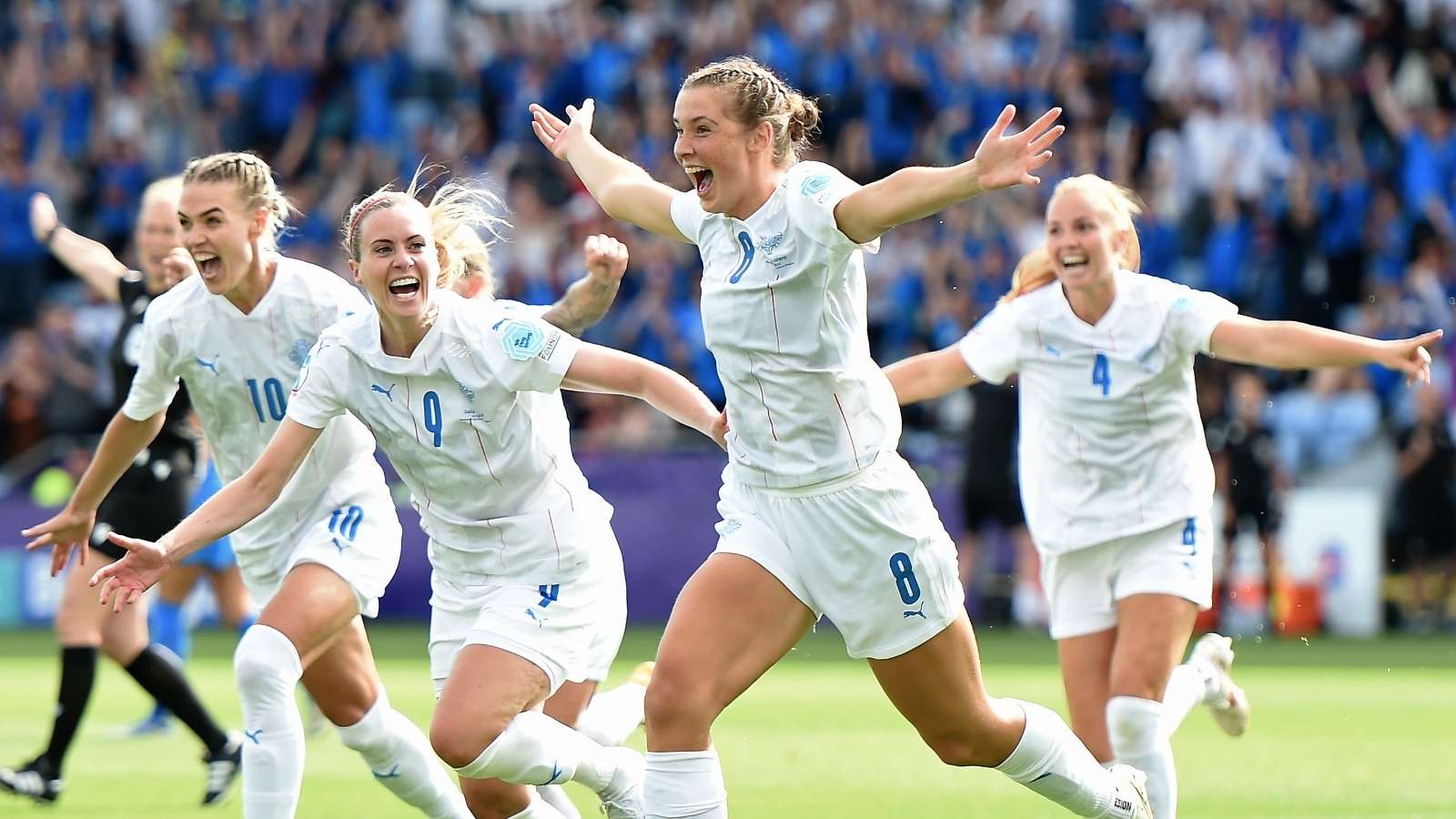When Iceland take to the pitch on Monday night, they’ll do so knowing a win will secure their place in the knockout rounds of the Women’s Euros. However, their opponent will be a nation with a capital city more than five times the size of its entire population.
Less than 370,000 people live in Iceland, a number that equates to just 17 per cent of the inhabitants of Paris. Given that stark contrast, that the two are meeting at a major tournament is remarkable in itself.
“We know we don't have the same strengths as France,” defender Glodis Viggosdottir told GOAL ahead of the game. “They have more technical players. They're probably faster than most of our players.
“But we just know what our strengths are and we focus on them. When it comes down to it, it's just football. It's just 11 against 11.”
Iceland is the smallest country ever to qualify for a Euros, on both the men’s and women’s side. The former famously knocked out England in 2016 at their first major tournament appearance, then qualified for the World Cup two years later.
Next Match
The latter is the goal for the women now, who are appearing at their fourth successive Euros. So while participation at these huge competitions is incredible, it’s not something new either – and it’s not just being there that counts for this country.
Thorsteinn Halldorsson, head coach of the women’s national team, laughs when GOAL asks for the secret of how they do so much with so little. “If I knew, I would be selling it all over the place!” he responds.
But there is not necessarily one magical factor that means this small island can compete with – and beat – some of the biggest and best footballing countries on the planet.
Asmundur Haraldsson is Halldorsson’s assistant and has been working with the Football Association of Iceland (KSI) since 2013. He’s well-versed in the country’s set-up, then, which has played a key role in its success.
“From the age of four or five, whenever you're ready to play, you get into the club system and then anyone can play until whenever. There's not really a selection to it. You never get cut from a team or anything like that, so we have about 99 per cent accuracy in that,” he tells GOAL, with a chuckle at his stat.
“We don't have this academy system,” Halldorsson explained. “You're not picked out when you're 10 years old and you have to stop or go to some other worse team. You can always be in your own team until you're at least 19. The system is quite good.”
In that system are high quality coaches, too, rather than just anyone volunteering. Every coach needs a UEFA B Licence, even if they’re only coaching a junior team, and those qualifications are both cheap and often funded by clubs. As a coach gets to working with older age groups, that criteria becomes a UEFA A Licence.
With the youth teams, the KSI will often bring 15-or-16-year-olds in to assist and learn as they are picking up their coaching badges, too, while specific goalkeeping coaches are incredibly common, even going down to around the under-12 level. “We take great pride in the coaching education in Iceland,” Haraldsson says.
 Getty/GOAL
Getty/GOALWhat it creates is an incredibly well coached pool of players, which is certainly evident in the young generation coming through now who have benefited most from the growth of the set-up – which includes more divisions and also better facilities.
“We call them the turf generation in Iceland, because they didn't have to play on the sh*t grass,” Viggosdottir explains, referring to the likes of Bayern Munich’s Karolina Lea Vilhjalmsdottir, aged 20, and Wolfsburg winger Sveindis Jonsdottir, aged 21. “They are very good with the ball and I think that gives us a lot.”
It’s not just about the quality of the youngsters, though. The generations before them paved the way to where Iceland is today, going back to the team that, in 2007, beat France 1-0 in a qualifying campaign that ended with tickets to Euro 2009, the country’s first ever senior major tournament on the men’s or women’s side.
There are players in this team that have been at the highest level for a long time – such as captain Sara Bjork Gunnarsdottir, who is a two-time Champions League winner with Lyon – and those a little older than that ‘turf generation’ who are there now, such as Viggosdottir herself, who signed for Bayern last summer.
“We have more players that are playing out in the big clubs in Europe, which means you play these [big] games many times per year,” the defender explains. “Coming [to the Euros] isn't a huge difference from when you're playing with your club. I think that experience makes a very big difference.”
While it has become an overused cliché to reference a team’s great ‘blend’ of youth and experience, Iceland really has it, but with the latter group having lots of top level exposure, too.
“We have a lot of young players playing senior football,” Haraldsson adds. “A few years ago, we only had two leagues. Now, we have four, so we have a bigger pool of players to select from.
 Getty/GOAL
Getty/GOAL“In the next five years to 10 years, players from Iceland are going to be technically better, tactically better and physically stronger. If we're going to keep up with international football, we have to take care of the foundation in our country to be able to keep up with everyone else.”
The biggest leagues are already seeing the value of Icelandic players. A scroll through Halldorsson’s squad for the Euros and you’ll see the names of many huge clubs – Bayern, Milan, Juventus and more.
“I think it's more or less due to mentality,” Haraldsson says, talking about those thriving abroad. “[Icelandic players] adapt. They can cope with change, they can cope with negative things, they can cope with difficult times, being in and out of the team. Whatever it is, they can cope with it. It's just a strong mentality, I think, what the players possess.”
That’s a key element of this small country’s success that simply cannot be noted and copied. When GOAL asks Viggosdottir what gives her such unwavering belief that Iceland can beat France on Monday, she doesn’t need to take a pause to think. She knows the answer.
“I think it's just how we are as Icelandic people,” she says. “We always believe that we can beat anyone and I think that's a huge part of why we have success as well, because we have 400,000 people to choose from and we still make it to these big tournaments and we're doing well. It’s just like, 'Nobody is too big for us.' We believe that we can do it.”
A side effect of that is the incredible team spirit it creates, with Haraldsson highlighting the “mindset” but also the “unity” within.
“The players are very tight, the staff is tight, and the whole group is tight,” he explains. “That's one of the things that we're working on very closely, to create that team unity. That's the thing that's going to hopefully push us through to the knockout stage.”
 Getty
Getty“As players, we want the best for each other,” Viggosdottir adds. “We don't have individuals that are just thinking about themselves. We will do whatever we can to back each other up. If somebody has been beaten, somebody else is there to back them up and I think that's special and that's a team that I want to play for. That's so important.”
It’s not just on the pitch that such unity shines through. When Iceland faced Italy on Thursday evening, a game that ended in a draw that disappointed both teams in their bid for a quarter-final berth, the scenes at the full-time whistle encapsulated as much.
Led by those packed into the far stand, almost the entirety of the Manchester City Academy stadium engaged in the famous Viking clap, fans from the Nordic nation having taken over the city for its two fixtures at the ground.
Add that incredible support into the equation and it’s just another reason for Iceland to believe they can pull off a shock result.
“I think the biggest thing that we take from this is, we haven't lost yet,” Viggosdottir said after that game. “We haven't lost a game and if we can keep it to zero against France, I think we are a team that can always score.
"We're really good at set pieces, we have our counterattacks and I think the team we have now, on a good day, we can beat France.
“It’s a final for us. We have to win. We have to give it our all. Either way it goes, we're going to leave it all on the field.”


